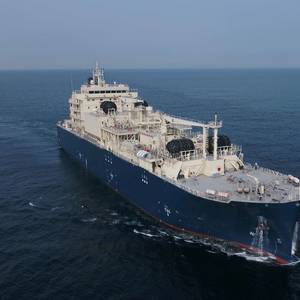
LNG Bunkering Market: Introduction
The global LNG bunkering market is still in the initial phase of development. As a result, there are only a few notable players in this growing market. This market is capital intensive, as building LNG bunkering terminals at trading ports requires significant capital investment. Moreover, port locations may act as an entry barrier for some companies, states a new report by Transparency Market Research (TMR). This is compounded by the fact that nearly all LNG suppliers offer standard fuel grades, leaving little room for achieving product differentiation. LNG bunkering companies usually enter into long-term LNG supply agreements with plant operators, thereby making it difficult for them to switch to any other LNG supplier for a fixed period of time.
The consumption of LNG is restricted to a few ports. LNG producers are collaborating with ship operating companies to develop LNG bunkering facilities at major international ports. The bargaining power of suppliers is expected to be medium over the next few years, owing to increase in the supply of LNG as a bunker fuel in major shipping centres of the world.
Get PDF sample for Industrial Insights and business Intelligence – https://www.transparencymarketresearch.com/sample/sample.php?flag=S&rep_id=3231
Emphasis on Lower Emissions Drives Demand for LNG Bunkering Fuel
LNG bunkering is the only a feasible option available that not only complies with MARPOL regulations, but also meets the NOx emission control area (NECA) and sulfur emission control area (SECA) requirements. LNG fuel offers lower ship emissions as compared to traditional bunker fuels. The International Maritime Organization (IMO) also assists international ports in building the infrastructure for LNG bunkering.
LNG is more economical than marine gas. Several new LNG plants are being constructed, which is creating a positive outlook for the market. The demand for LNG bunkering fuel is exceptionally high from offshore support vessels and ferries, states TMR. Since the exploration sector is growing, the consumption of LNG bunker fuel is also increasing.
Lack of Bunkering Infrastructure Restricts Market Growth
LNG is supplied as a bunker fuel in a limited number of ports. LNG bunkering facilities are not available in major ports of the world. Thus, the inadequate bunkering infrastructure restricts the adoption of LNG bunker fuels. Additionally, the bunkering infrastructure required for using MDO/MGO as marine fuel is already present in all major ports of the world. The availability of these fuel grades in all bunkering ports of the world is expected to threaten the global LNG bunkering market. The IMO has enforced the energy efficiency design index, which sets minimum energy efficiency requirements for ships constructed after 2020. Since these ships are specifically designed to consume less marine fuel, the demand for bunker fuel is expected to slow down.
Large bunker storage requirements in LNG fuel vessels require double the on-board space as compared to conventional diesel engine fuels. Many safety requirements need to be met while LNG bunkering is being carried out. Moreover, companies have to spend significant amount of time and capital in training crew members. All these factors are anticipated to hamper the growth of the market significantly.
Immediate Delivery Available | Save up to 20% by purchasing this Premium Research Report – https://www.transparencymarketresearch.com/checkout.php?rep_id=3231<ype=S
Expansion of ECAs Create New Growth Opportunities for LNG Bunkering Market
Rise in concerns regarding sulfur emissions is expected to result in a possible declaration of new ECAs. “The Gulf of Mexico, Turkish Straits, Sea of Japan, and Strait of Malacca are anticipated to be declared as ECAs in the near future,” states a TMR analyst. This is expected to propel the demand for LNG bunkering, creating new growth opportunities in the market.
LNG Bunkering Market: Key Players
Some of the companies operating in the market are Harvey Gulf International Marine LLC, Gasnor AS, Korea Gas Corporation, Royal Dutch Shell plc, and Gazpromneft Marine Bunker LLC.
Related Reports –
Waste Management Market – Waste Management Market is Estimated to Progress at a CAGR of 4.1% during the Forecast Period 2022-2031
Hydrogen Storage System Market – Hydrogen Storage System Market is Estimated to Progress at a CAGR of 11.9% during the Forecast Period 2021-2031
District Cooling Market – District Cooling Market is Estimated to Progress at a CAGR of 7.8% during the Forecast Period 2022-2031
About Transparency Market Research
Transparency Market Research, a global market research company registered at Wilmington, Delaware, United States, provides custom research and consulting services. The firm scrutinizes factors shaping the dynamics of demand in various markets. The insights and perspectives on the markets evaluate opportunities in various segments. The opportunities in the segments based on source, application, demographics, sales channel, and end-use are analysed, which will determine growth in the markets over the next decade.
Our exclusive blend of quantitative forecasting and trends analysis provides forward-looking insights for thousands of decision-makers, made possible by experienced teams of Analysts, Researchers, and Consultants. The proprietary data sources and various tools & techniques we use always reflect the latest trends and information. With a broad research and analysis capability, Transparency Market Research employs rigorous primary and secondary research techniques in all of its business reports.
Contact Information:
Nikhil Sawlani Transparency Market Research Inc. CORPORATE HEADQUARTER DOWNTOWN, 1000 N. West Street, Suite 1200, Wilmington, Delaware 19801 USA Tel: +1-518-618-1030 USA – Canada Toll Free: 866-552-3453 Website: https://www.transparencymarketresearch.com Blog: https://tmrblog.com Email: [email protected]
Tags:
Reportedtimes, Financial Content, iCN Internal Distribution, Extended Distribution, Research Newswire, English
